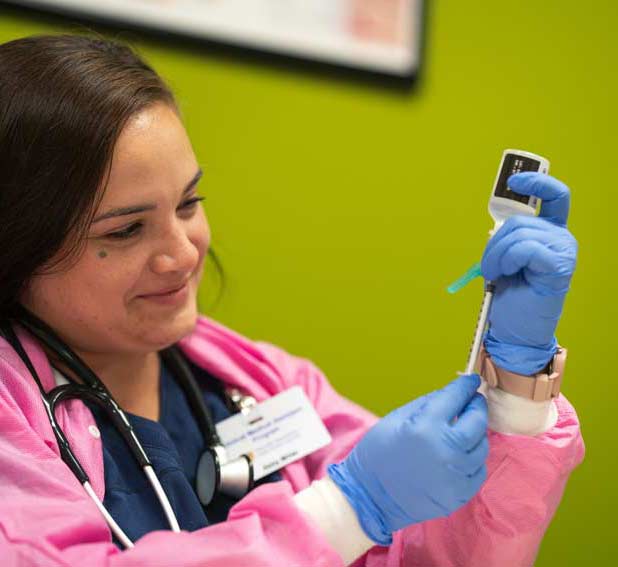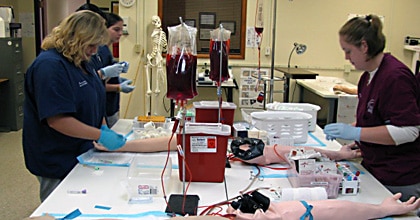Phlebotomy Courses Near Me: How to Compare Programs
Phlebotomy Courses Near Me: How to Compare Programs
Blog Article
The Course to Qualification: Recognizing the Phlebotomy Educating Training Course Journey and Its Value
As you take into consideration the path to accreditation in phlebotomy, it's essential to comprehend the duty you'll play in health care. Your training will certainly cover crucial abilities, from blood collection techniques to patient interaction.

The Duty of Phlebotomists in Health Care
Phlebotomists play an essential function in the healthcare system, working as the essential link in between clients and essential diagnostic screening. You'll execute blood attracts, guaranteeing samples are collected precisely and safely. Your knowledge helps in diagnosing medical problems, keeping an eye on wellness, and directing treatment decisions.
In your everyday interactions, you'll require to establish trust fund with clients, making them really feel comfy during what could be a stressful experience. You are in charge of labeling and dealing with examples meticulously to protect against contamination or mistakes, which can influence test outcomes.
Beyond this, you'll often function along with medical professionals and registered nurses, communicating vital information concerning clients' conditions. Your function is basic in keeping the process in medical care setups, making sure prompt and exact results. By grasping your skills, you contribute meaningfully to patient treatment, making you an indispensable component of the medical team. Welcoming this obligation is vital to your success as a phlebotomist.
Review of Phlebotomy Training Programs
When discovering phlebotomy training programs, you'll find numerous kinds made to fit different schedules and learning designs. Each program helps you develop crucial abilities like blood collection and person communication. Comprehending these alternatives is essential to choosing the best path for your occupation.
Kinds of Training Programs
Numerous types of training programs are offered for those looking to come to be skillful in phlebotomy. You can select from certification programs, which usually last a couple of months and concentrate on important abilities. There are also diploma programs that give a more comprehensive education, often lasting as much as a year. If you're trying to find a deeper understanding, an associate degree in a relevant area might be the best fit. On the internet training courses provide versatility for those stabilizing work or family members commitments, permitting you to study at your very own speed. Furthermore, some hospitals and centers use on-the-job training programs, supplying sensible experience while you discover. Whatever path you pick, each program intends to outfit you with the required abilities for an effective phlebotomy job.

Key Abilities Created
Mastering phlebotomy needs a set of vital abilities that are developed via comprehensive training programs. You'll find out technological skills like correct vein option, needle insertion, and blood collection strategies. These hands-on techniques ensure you can carry out treatments safely and efficiently. In addition, interaction abilities are essential; you'll need to communicate with clients, explain treatments, and placed them secure. Comprehending makeup and physiology is critical, also, as it helps you locate veins and comprehend the body's reaction to blood draws. Finally, you'll acquire expertise of safety and security procedures and infection control, assuring you keep a clean and sterile setting. Each of these skills is necessary for your success as a certified phlebotomist, making you a valuable asset in any type of medical care setting.
Key Elements of a Phlebotomy Training Course
In a phlebotomy course, you'll focus on vital subjects that lay the foundation for your future career. You'll take part in hands-on training that enables you to apply what you have actually discovered in real-world setups. Both the core educational program and useful experience are important for your success as a phlebotomist.
Curriculum Summary
While pursuing a phlebotomy training course, you'll encounter a core educational program designed to furnish you with fundamental skills and knowledge. Phlebotomy Training Course. This educational program normally consists of anatomy and physiology, concentrating on the blood circulation system and comprehending blood parts. You'll likewise find out about various kinds of blood collection techniques, including venipuncture and capillary slit strategies
Additionally, infection control and safety procedures are important parts, guaranteeing you know just how to preserve a clean and sterile atmosphere. You'll study patient communication, highlighting interaction and empathy, which are important for relieving client anxiousness.
Hands-On Training Experience
Getting hands-on experience is an indispensable part of your phlebotomy training program. This functional training permits you to use what you have actually discovered in a real-world setting, boosting your abilities and confidence. Phlebotomy Classes Near Me.
In addition, you'll get the opportunity to connect with people, which is necessary for creating your interaction abilities. This mix of technical efficiency and interpersonal skills is vital for your success as a certified phlebotomist. Eventually, hands-on training is where concept satisfies practice, strengthening your knowledge and readiness for accreditation.
Certification and Licensing Requirements
Before you can begin your job in phlebotomy, it is vital to comprehend the certification and licensing needs that differ by state. A lot of states need phlebotomists to hold an accreditation from an identified company, such as the National Phlebotomy Organization or the American Culture for Scientific Pathology. These qualifications commonly include passing a test that examines your expertise and skills in the area.
Along with qualification, some states have details licensing needs. You might need to finish a particular number of hours in scientific technique, submit evidence of training, or undergo a background check. It is vital to research your state's regulations to make certain you fulfill all essential criteria.
Staying notified about these demands not only aids you protect a placement yet also improves your reputation as an expert. By fulfilling these needs, you'll be well on your method to an effective career in phlebotomy.
Hands-On Training and Practical Experience
Hands-on training and practical experience are necessary elements of your phlebotomy education and learning, as they enable you to use theoretical expertise in real-world situations. During your training, you'll take part in supervised venipuncture, learn appropriate techniques, and become knowledgeable about various blood collection equipment. This straight participation is important for building your confidence and developing your skills.
You'll function closely with experienced professionals that can guide you with the subtleties of person communication and example handling. Each session not only strengthens your understanding yet additionally prepares you for the fast-paced environment of health care settings.
Furthermore, several programs integrate scientific turnings, permitting you to experience varied settings, from healthcare facilities to outpatient centers. This exposure assists you adjust to various challenges and client needs, guaranteeing you're well-prepared for your future duty. Welcome these possibilities, as they're vital to coming to be a qualified and compassionate phlebotomist.
Difficulties Faced Throughout Training
While obtaining hands-on experience is important, it's essential to recognize the difficulties that can emerge during your phlebotomy training. In addition, understanding the abilities required for blood draws takes practice; you may struggle with technique originally.
Time monitoring can additionally be a difficulty, as balancing concept, sensible sessions, and personal commitments can feel challenging. You may face varying finding out paces among your peers, bring about sensations of insecurity if you think you're falling behind. Adjusting to the various personalities of instructors can be tough, as each may have an unique mentor style.
Recognizing these barriers beforehand can prepare you for success and help you create resilience throughout your training journey.
Career Opportunities After Accreditation

As you get experience, you may also think about specializing in locations like pediatric or geriatric phlebotomy, providing to particular person demands. Some phlebotomists select to advance their careers by coming to be laboratory professionals or seeking further education in healthcare fields.
In addition, your qualification can lead to duties in training or managing brand-new phlebotomists, allowing you to share your knowledge. With the healthcare market continuously expanding, your skills will always be in need, leading the way for a steady and fulfilling occupation. Welcome the opportunities waiting on you!
Often Asked Concerns
What Is the Normal Period of a Phlebotomy Training Training Course?
Phlebotomy training programs usually last around four to 8 weeks. You'll take part in hands-on technique, classroom direction, and on the internet knowing. Finishing this training prepares you for qualification and a fulfilling profession in medical care.
Are Online Phlebotomy Courses Available?
Yes, on-line phlebotomy programs are offered. They provide adaptability and comfort, enabling you to examine at your very own pace. Simply confirm the program is recognized to meet certification demands and obtain important abilities for your occupation.
Just How Much Does Phlebotomy Training Generally Cost?
Phlebotomy training generally sets you back in between $700 Phlebotomy Courses Near Me and $2,500, relying on the program and location. You must take into consideration variables like training course size, included materials, and hands-on experience when picking the ideal training for you.
What Prevail Prerequisites for Phlebotomy Training?
Typical requirements for phlebotomy training frequently include a high institution diploma or GED, immunizations, and a background check. Some programs may also call for standard healthcare expertise or certifications, ensuring you're prepared for hands-on training.
Can I Work While Finishing My Phlebotomy Training?
Yes, you can function while completing your phlebotomy training. Several pupils equilibrium tasks with their studies, yet make sure to handle your time efficiently to assure you meet both job and training commitments efficiently.
Report this page